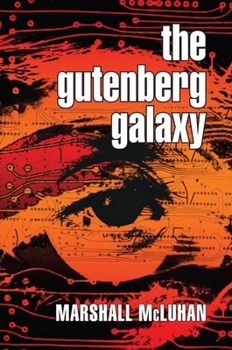The Gutenberg Galaxy: The Making of Typographic Man
Select Format
Select Condition 
Book Overview
Since its first appearance in 1962, the impact of The Gutenberg Galaxy has been felt around the world. It gave us the concept of the global village; that phrase has now been translated, along with the rest of the book, into twelve languages, from Japanese to Serbo-Croat. It helped establish Marshall McLuhan as the original 'media guru.' More than 200,000 copies are in print. The reissue of this landmark book reflects the continuing importance of McLuhan's...
Format:Paperback
Language:English
ISBN:0802060412
ISBN13:9780802060419
Release Date:March 1962
Publisher:University of Toronto Press
Length:294 Pages
Weight:1.08 lbs.
Dimensions:0.9" x 6.1" x 9.1"
Customer Reviews
4 ratings
Shooting probes
Published by Thriftbooks.com User , 18 years ago
This is the first McLuhan book I read, back in the late 1960s. It took me about a month to get through, because each short chapter contained so many new ideas and insights I had to think about them before going on. I didn't always understand them, but what I did comprehend was intoxicatingly exciting. Many readers of McLuhan treat his probes as absolute statements of truth. Then, if they disagree with him, they reject his whole approach. One important fact to keep in mind while reading this or any of McLuhan's books is that he himself refers to the clever slogans which sum up many of his insights ("The medium is the message" being the best known, of course) as "probes", not facts. Their purpose is to explore an idea in order to stimulate thought. Even if you ultimately disagree with the concept set forth, if it makes you think about it, the probe has accomplished its principal purpose.
The orality/literacy debate and McLuhan's media theory
Published by Thriftbooks.com User , 19 years ago
This book expands on the views of McLuhan's teacher Harold Innis, who distingusihed oral and written cultures. The book argues that oral cultures are synaesthetic and work with synthetic logic, while cultures of writing push the mind toward singulation of senses, logic and 'perspective'. McLuhan 'glosses' through a wide range of scattered historical pieces of information to show how oral, written and print cultures have different patterns. He ably shows how printing also transformed art, architecture, society and industry. The book is thoroughly historical, dense and rich in informative detail. It forms the foundation for McLuhan's clearer theoretical articulation of his ideas in 'Understanding Media', but is more accessible to the layman. This book belongs to a pantheon of books that revolve around similar ideas like Harold Innis's 'Empire and Communications' & 'The Bias of Communication'; Walter J. Ong's 'Orality and Literacy' and William J. Ivins's 'Print and Visual Culture' and 'Art and Geometry'. But this is the most sweeping, convincing, dramatic statement of the common theory proposed by these various writers. And for those who love theory with a dose of history, this makes for really delightful reading.
McLuhan - As Always, Brilliant
Published by Thriftbooks.com User , 24 years ago
One can almost think of "The Gutenberg Galaxy" as the "prequel" to Marshall McLuhan's much better known "Understanding Media," because "Galaxy" does for print techology what "Media" does for electronic technology. Basically McLuhan assesses how European civilization went from an ear-touch (listening) oriented mode of receving information to an eye-oriented (that is, reading) mode of receiving information. Recalling that for McLuhan, the medium IS the message, so the invention and dissemination of printing-press technology and the sharp rise in literacy it occasioned therefore brought about a major seismic shift in Western thought and all that goes with it--language, mores, dress, politics, etc.Another way of looking at this is to say that in McLuhan's view, history is not determined by politics or economics or weather or science per se so much as by our media--the "extensions of man." This book is a must-read followup to anyone who liked "Understanding Media"; it's also a great book to cut one's teeth on before reading "Understanding Media" because it's a more traditional (i.e., formal and linear) type of academic work. And undeniably brilliant. For what it's worth, I was a communications major at the University of Virginia in the mid-1970s when reading McLuhan's work was rougher than it is now; many of his concepts like "global village" have since filtered thru society. But I read all of McLuhan's media-oriented writings, wrote term papers on him, and feel as though I benefited as a result--he's the main reason I'm a writer today.Allen; charless@ync.net
The Best of McLuhan's Writing
Published by Thriftbooks.com User , 26 years ago
The best of McLuhan's media analyses and published before his 60's stardom. Written in his "mosaic style" (would be easily adapted to hypertext) it remains an excellent analysis of how both the written word (letters) and the printed work (starting with Guttenberg) altered human perception. It is full of interesting observations (and the usual collection of his favorite Joyce quotes) and more accessible than many of his later works.Highly Reccommended!!





